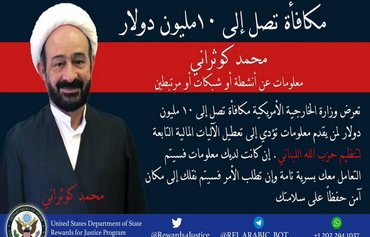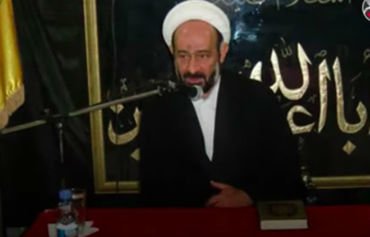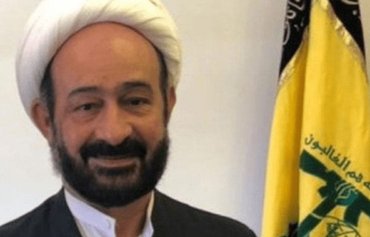Iraqis angered by Iran's influence in their country are increasingly agitated by the presence of Hizbullah power-broker Muhammad Kawtharani, widely perceived as a replacement for slain Iranian general Qassem Soleimani.
A dual citizen of Lebanon and Iraq, Kawtharani emerged as Iran's point man in Iraq after Soleimani, who had commanded the Islamic Revolutionary Guard Corps Quds Force (IRGC-QF), was killed in January.
The transition took place amid general upheaval and protests that began in October, during which thousands took to the streets to denounce Iran's interference in Iraq, government corruption and the state of the country.
The US on April 19th announced a $10 million cash reward in return for "any information on Kawtharani's movements, networks and partners".
Iraqi activists recently circulated photos online showing Kawtharani with Shibel al-Zaidi, leader of the Iran-backed Imam Ali Brigades militia, in the courtyard of a house in Baghdad's al-Jadriya neighbourhood.
They declared Kawtharani's presence in their country as unwelcome and denounced his engagement with militia leaders.
Prime Minister Mustafa Kadhemi has banned the entry of any non-Iraqi into the country without an official visa, according to an Iraqi government official who asked to remain anonymous.
"This applies to Kawtharani and others who were entering Iraq [without a visa]," the official told Diyaruna.
Kawtharani's activities in Iraq involve co-ordinating with the IRGC and its proxy militias on support for the Syrian regime. He also is involved in financial activities, all of which the government wants to stop, the official said.
Kadhemi's government has inherited "a very heavy legacy", the official said, and now seeks to dismantle Iran-backed militias with the support of the Iraqi people, who have rejected Iran's interference in their country.
'Offensive to Iraqis'
Many Iraqis question the purpose of Kawtharani's visits to Iraq, and believe his actions are "definitely not in the interest of Iraq or the Iraqi people but rather serve Iran", said political activist and al-Muwatana party head Ghaith al-Tamimi.
Ali al-Saadi, a member of the Iraqi Civil Movement who is involved in co-ordinating protests in Baghdad's Tahrir Square, told Diyaruna that Kawtharani’s presence in Iraq "is no longer acceptable".
"There is no explanation for it other than that [Kawtharani] works to recruit youth to fight in Syria, steal money from Iraq, engage in illegal activities in the country or threaten the US-led international coalition forces," he said.
All these actions bring nothing but instability and ruin, he added, noting that Kawtharani should not remain in Iraq.
Kawtharani's presence in Baghdad and his engagement with politicians is "offensive to Iraqis", as he is acting with Iran's support to violate Iraq's sovereignty, said a Basra activist who asked to remain anonymous.
The activist accused Kawtharani of playing a role in suppressing protests that took place while the government of former Prime Minister Adel Abdul-Mahdi was in power, as he had been overseeing Iran-backed militias in place of Soleimani.
Increased political engagement
Iraqis are taking a keen interest in Kawtharani's presence and activities, which points to a "major revival of Iraqi society", Iraqi affairs expert Abdullah al-Rikabi told Diyaruna.
"Previously, people used to think that their opinions were not important, but this changed significantly after the protests," he said.
Now Iraqis reject Kawtharani and call him derogatory nicknames, he said, such as "the face of evil", "the owl" and "gatekeeper", in reference to his role as point man in the post-Soleimani era.
It is especially significant that the anger against Soleimani is coming from southern cities such as al-Najaf and Karbala, a sign that Iraqi Shias "reject the exploitation of religion in service of the Iranian regime's aim", al-Rikani said.

![An undated image taken during a meeting shows Hizbullah power-broker Muhammad Kawtharani at the party's political council quarters in the southern suburbs of Beirut. [AFP]](/cnmi_di/images/2020/08/25/25619-Lebanon-Beirut-Hizbullah-600_384.jpg)







All our love and appreciation be to the men of resistance who are the hope of this nation to restore its pride and dignity. They're the striking force and the thorn in the eyes of the arrogant and oppressors and those Zionist Arabs who have sold off their land and honour with their normalisation which has harmed the Muslim and Arab nation. Shame and disgrace to them! The men of resistance are the crown on the heads of Arabs who should be proud of them.
Reply6 Comment(s)
This article is the result of the imagination of Gaith al-Tamimi and his likes who are living off on inciting sedition.
Reply6 Comment(s)
This is rejected. Al-Kawtharani is an unreal character who America and its Facebook and social media activists created. He is a mujahid who is coordinating between Hezbollah and Iran and the resistance factions. His shoes are more honourable than you and the agents of normalisation.
Reply6 Comment(s)
Your words are untrue. We’re confronting the US presence so that it may not dominate the region and control its resources. As to you, as its worshippers, you’ll always defend America because you have no honour or real religion to respect, which is the religion of Muhammad (PBUH). The abandoned question which everybody fears to ask is: what do you call the America-Iraq war in 2003, which ended with the fall of Saddam Hussein? Was it an occupation or a liberation war? What should we call this war? This is a fundamental and important question that would resolve many of the issues. The concept of occupation has changed for us and has been replaced with the concept of liberation. Who said that this was a liberation war? Did the Iraqis say that? The UN itself is calling it occupation, why then do you insist on calling it liberation? This is professional brainwashing. Saddam was a criminal and a dictator. We all agree on this. However, this shouldn’t make us avoid the original terms and use new things. Saddam was a criminal and America is an occupier. Let not Saddam’s injustice make you do injustice to yourselves and maim the minds of new generations. What happened in 2003 was occupation, not liberation.
Reply6 Comment(s)
As an Iraqi, I’m honoured to have al-Kawtharani in Iraq. This is to strike a balance with the US influence which is trying very hard to normalise relations with the Zionist entity. His presence in Iraq proves that Iraq is part of the axis of resistance which is silencing all the filthy Zionists.
ReplyWell said! In order to know whether you’re under the influence of oriented media or follow your own mind, and in order to know whether your stances are the result of accumulated media pressures or firm principles, just look at your reactions to the interventions of Turkey, for example, and see whether they’re like your reactions to the interventions of Saudi Arabia and America. Are they like your reactions to the interventions of Iran, for example? If yes, this is very good. However, if you only focus on Iran and America, criticising or defending either of them, or whatever your stance is, and then avoid Turkey and the Ottoman state it wants to create, you, unfortunately, are under the influence of the media orientation.
Reply6 Comment(s)